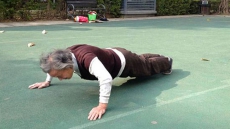Keeping physically and mentally active in middle age may lower the risk of developing dementia decades later, a study claims.
Mental activities included reading, playing instruments, singing in a choir, visiting concerts, and gardening, doing needlework or attending religious services, according to the study published in the journal Neurology.
"These results indicate that these activities in middle age may play a role in preventing dementia in old age and preserving cognitive health," said Jenna Najar from the University of Gothenburg in Sweden.
"It's exciting as these are activities that people can incorporate into their lives pretty easily and without a lot of expense," Najar said in a statement.
The study involved 800 Swedish women with an average age of 47 who were followed for 44 years. At the beginning of the study, participants were asked about their mental and physical activities.
Participants were given scores in each of the five areas based on how often they participated in mental activities, with a score of zero for no or low activity, one for moderate activity and two for high activity.
For example, moderate artistic activity was defined as attending a concert, play or art exhibit during the last six months, while high artistic activity was defined as more frequent visits, playing an instrument, singing in a choir or painting. The total score possible was 10.
Participants were divided into two groups. The low group, with 44 per cent of participants, had scores of zero to two and the high group, with 56 per cent of participants, had scores of three to 10.
For physical activity, participants were divided into two groups, active and inactive.
The active group ranged from light physical activity such as walking, gardening, bowling or biking for a minimum of four hours per week to regular intense exercise such as running or swimming several times a week or engaging in competitive sports.
A total of 17 per cent of the participants were in the inactive group and 82 per cent were in the active group.
During the study, 194 women developed dementia. Of those, 102 had Alzheimer's disease, 27 had vascular dementia and 41 had mixed dementia, where more than one type of dementia is present, such as the plaques and tangles of Alzheimer's disease along with the blood vessel changes seen in vascular dementia.
The study found that women with high level of mental activities were 46 per cent less likely to develop Alzheimer's disease and 34 per cent less likely to develop dementia overall than the women with the low level of mental activities.
The women who were physically active were 52 per cent less likely to develop dementia with cerebrovascular disease and 56 per cent less likely to develop mixed dementia than the women who were inactive.
The researchers took into account other factors that could affect the risk of dementia, such as high blood pressure, smoking and diabetes.
They also ran the results again after excluding women who developed dementia about halfway through the study to rule out the possibility that those women may have been in the prodromal stage of dementia, with less participation in the activities as an early symptom.
The results were similar, except that physical activity was then associated with a 34 per cent reduced risk of dementia overall.
Of the 438 women with the high level of mental activity 104 developed dementia compared to 90 of the 347 women with the low level of activity.
Of the 648 women with the high level of physical activity, 159 developed dementia, compared to 35 of the 137 women who were inactive.





